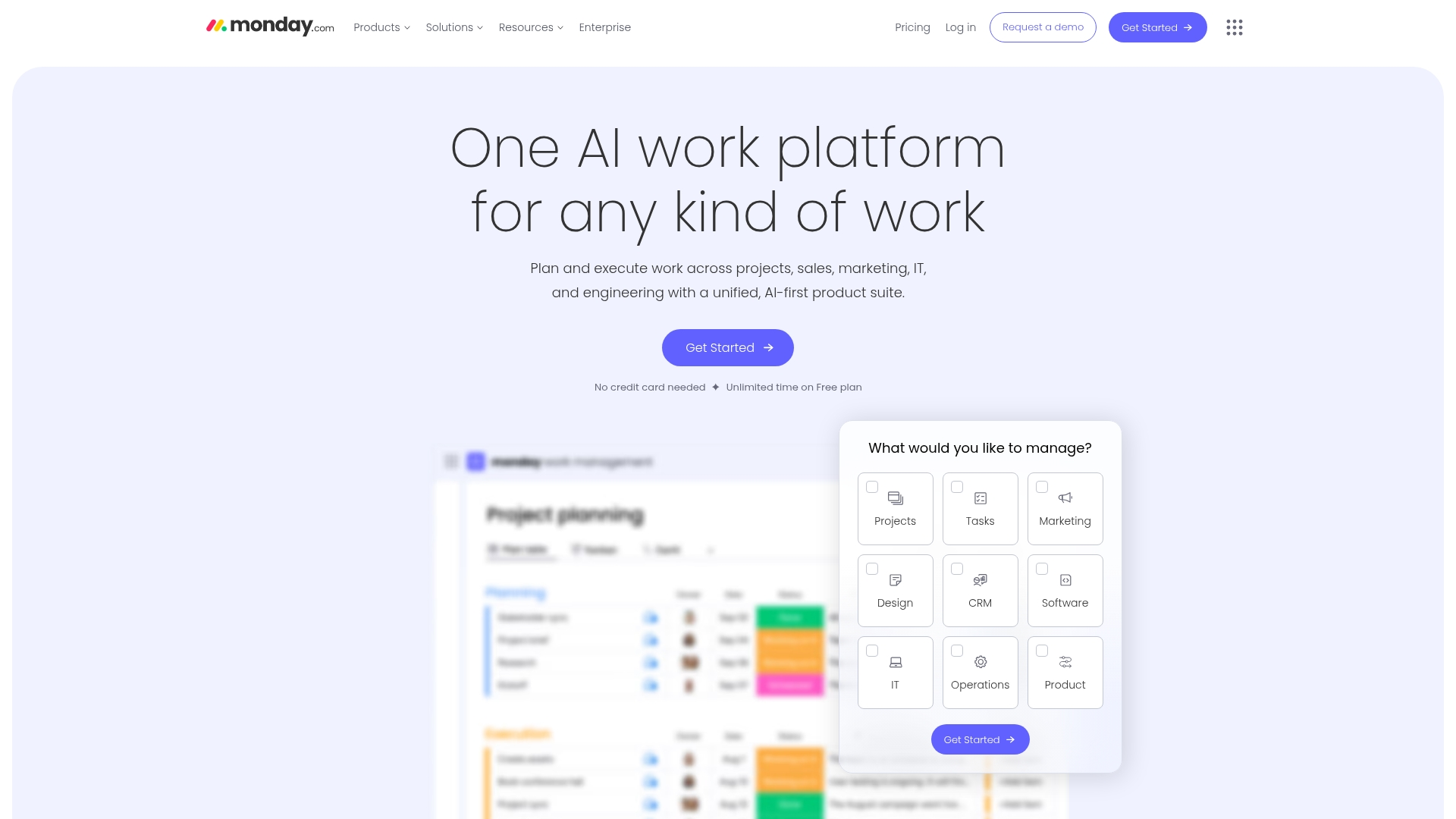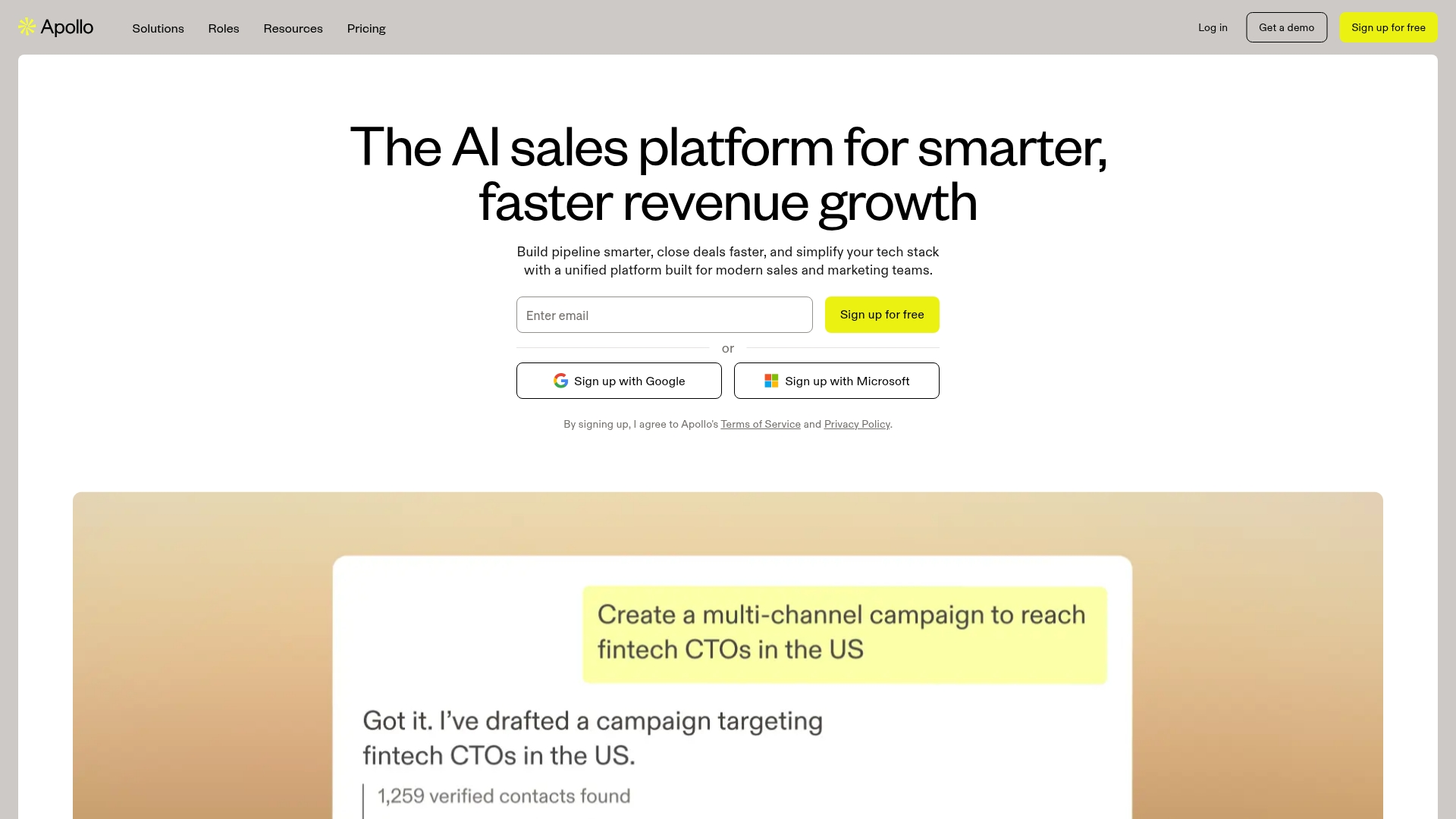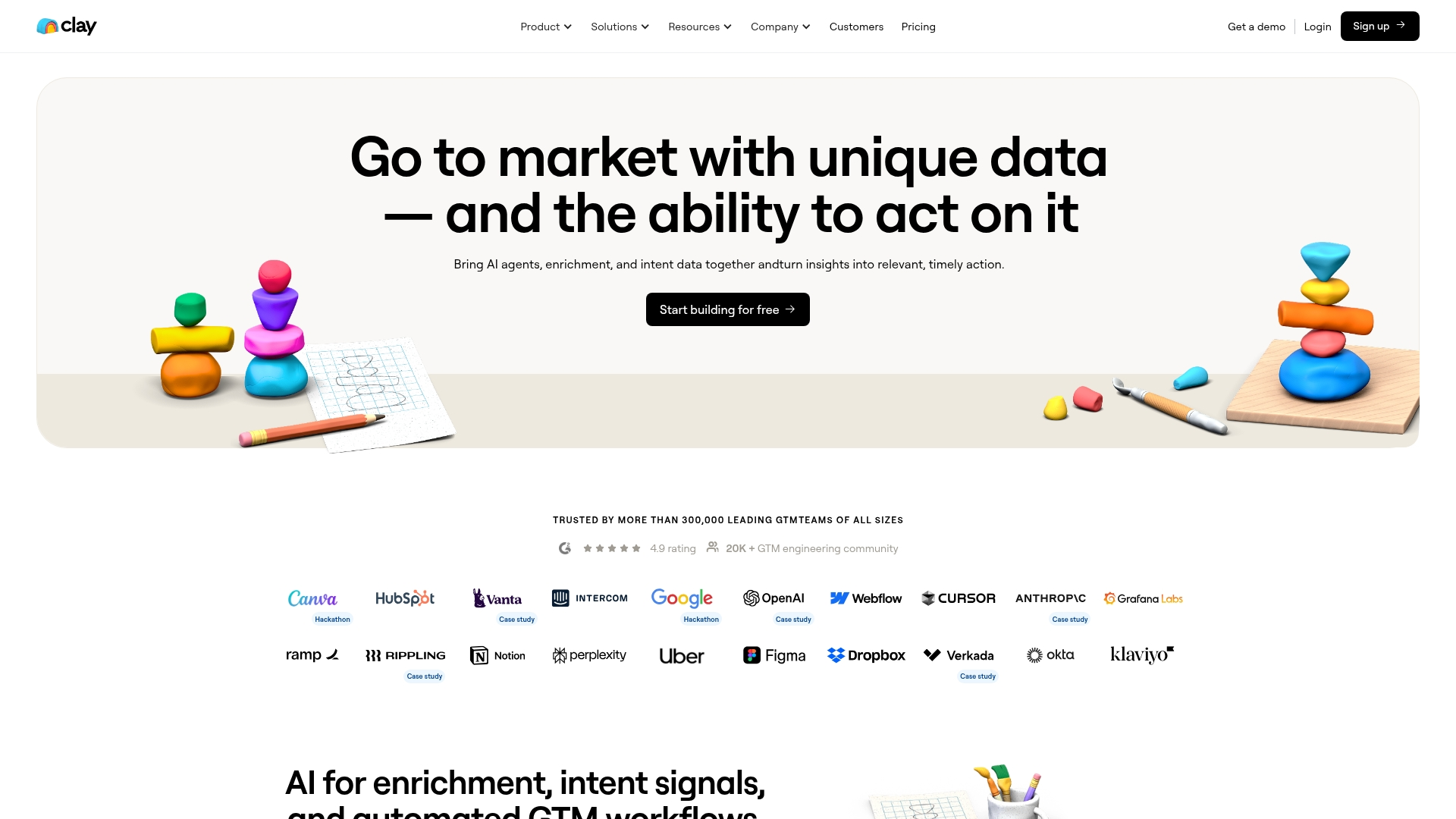The biggest myth about AI in sales is that it is here to replace the team. The reality is much more powerful: it is about amplifying top performers by automating the administrative grind that bogs everyone down.
Smart AI platforms for business development handle repetitive processes like lead qualification and data entry. This frees representatives to focus on what they do best: building relationships and closing deals. This power should be in the hands of the people doing the work, not just data scientists.
But how does one separate the hype from the tangible results? This helpful article explores exactly how to make that happen. We will explore the key benefits of AI, the essential platform categories every sales leader should know, and review the top options on the market.
Let’s get started.
Key takeaways
- AI amplifies, not replaces: the primary function of AI in business development is to amplify top performers by automating the administrative grind, not to replace the sales team.
- Focus on relationships: by automating repetitive tasks like data entry and lead qualification, AI tools free representatives to concentrate on building relationships and closing deals, which directly generates revenue.
- Strategic categorization is key: a high-performance sales engine requires a strategic playbook utilizing tools across essential categories: Lead Generation, AI-Powered CRM, Conversation Intelligence, and Sales Analytics.
- Visibility and control: effective AI integration delivers total pipeline visibility and control, transforming messy guesswork into a coherent, data-driven strategy.
- Integrated platforms excel: platforms like monday CRM integrate powerful AI features directly into a unified, visual workspace, offering enterprise capabilities without the complexity or need for coding.
What are AI business development tools?
AI business development tools are the team’s new MVP, handling the tedious tasks that drain time and energy. They use smart automation to take over data entry, lead qualification, and follow-ups. This frees representatives to focus on what actually drives revenue: building relationships and closing deals.
This is not just about automating tasks; it is about embedding intelligence right into the sales motion. AI tools can score leads with pinpoint accuracy, personalize communication for every prospect, and forecast deal outcomes so the team knows exactly where to focus. It is like having a data scientist and a sales assistant built for every single representative.
The real advantage is gaining total visibility and control over the pipeline without the complexity. The best tools integrate powerful AI features directly into a platform the team will actually love to use. This gives the team the power to automate the busywork, focus on the right deals, and close with more speed and confidence.
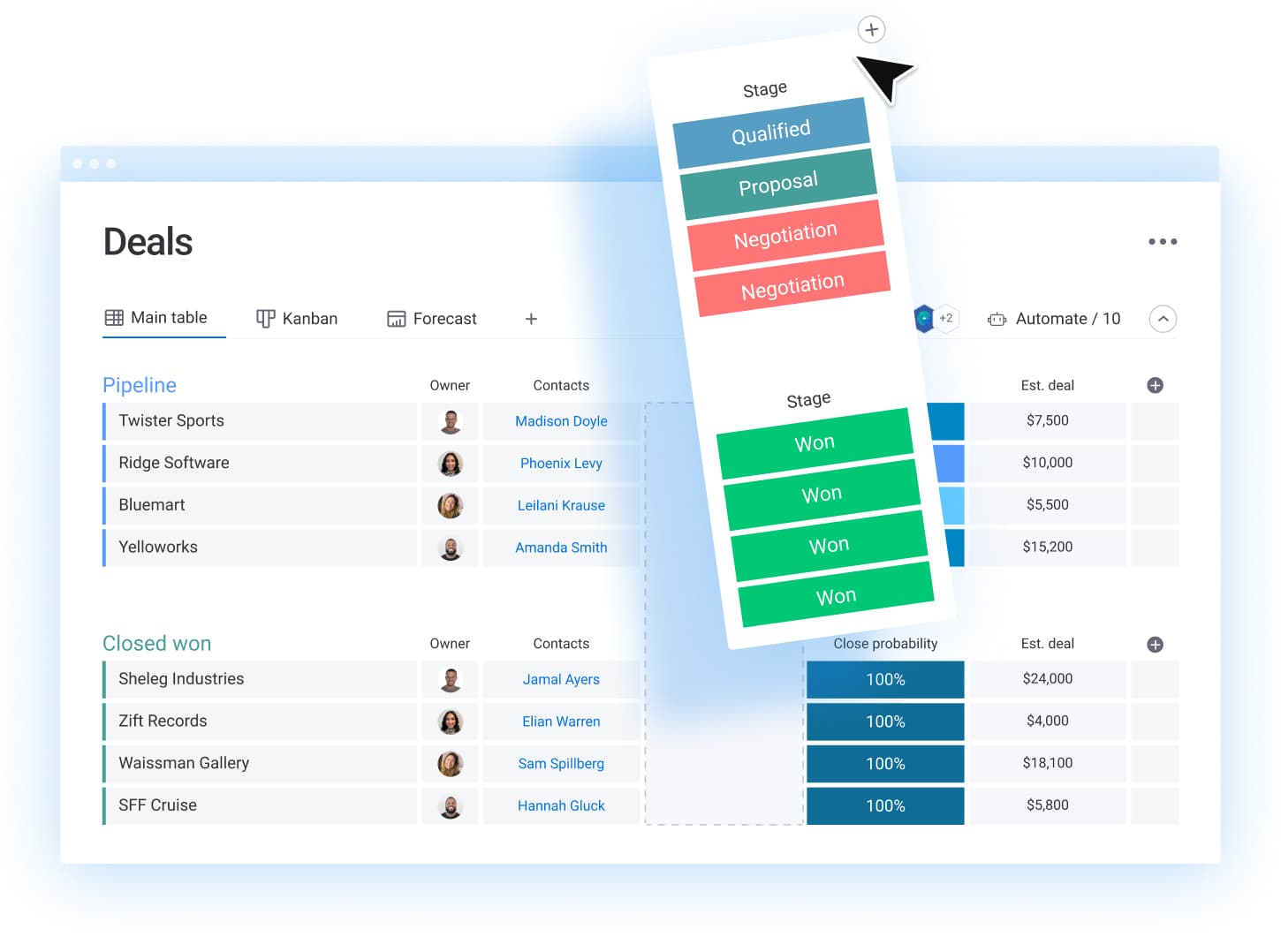
Key takeways
Beyond the hype, AI delivers a tangible competitive edge, transforming messy guesswork into a coherent winning strategy. It provides leaders with an unprecedented, detailed view of the entire sales operation and empowers representatives to excel at their core function: building relationships and closing deals.
- Accelerate lead generation and qualification: AI instantly cuts through the volume of potential leads, identifying and scoring prospects based on concrete data to ensure engagement focuses on the hottest opportunities first.
- Automate repetitive sales tasks: AI automation reclaims the 60–70% of the week typically lost to non-selling administrative activities, such as data entry and scheduling, allowing representatives to concentrate their energy on revenue generation.
- Improve sales forecasting accuracy: quarterly guesswork is replaced with data-driven certainty by analyzing historical performance and current pipeline health to deliver reliable revenue forecasts and flag at-risk deals.
- Enhance communication personalization: AI analyzes prospect data to tailor messaging, ensuring communication is highly personalized and delivered at the optimal time, treating each prospect as a one-on-one conversation.
- Streamline proposal and content generation: AI dramatically reduces the time required to build polished, on-brand proposals and sales materials from hours to minutes, freeing representatives to focus on closing.
- Optimize meeting and calendar scheduling: smart scheduling tools eliminate the friction of back-and-forth scheduling, allowing prospects to book meetings instantly and improving the initial impression of the sales process.
- Deliver targeted training and coaching: AI-powered coaching platforms analyze real-world performance data to identify specific skill gaps and deliver personalized, bite-sized training, transforming the entire team into high performers.
Best AI tools for business development explored
Choosing AI tools is easy in theory and overwhelming in practice. With new products launching every quarter and bold promises everywhere, it’s hard to know what actually moves the needle for a business development team.
This section cuts through the noise and spotlights the AI platforms that are already helping teams generate smarter leads, work faster, and close with confidence.

Top AI solutions for lead generation and prospecting
Prospecting should be a precise, data-driven process, not a guessing game of manual research and cold outreach. Modern AI tools have fundamentally altered this dynamic by handling the data-crunching grunt work, enabling your team to concentrate on what they do best: building relationships. The goal is not just to find more prospects, but to pinpoint the right ones with confidence and precision.
Let’s break down the key players that are helping revenue teams identify and engage their best prospects.
| Solution | Key features | Pricing approach | Best use cases |
|---|---|---|---|
| monday CRM | Visual pipeline, AI lead scoring, unified platform | Tiered, per-user | SMBs and mid-market teams needing all-in-one AI |
| Apollo.io | Large database, contact finding, sequence automation | Freemium, per-user | High-volume outbound and prospecting |
| Clay | Multi-source data enrichment, CRM integration | Usage-based | Enriching prospect data for targeted outreach |
| ZoomInfo | Enterprise B2B database, intent data, advanced search | Custom, enterprise | Large orgs, ABM, intent-driven prospecting |
| Clearbit | Real-time data enrichment, API integrations | Tiered, usage-based | Automatic CRM enrichment, web form intelligence |
1. monday CRM
monday CRM elevates business development with an AI-powered platform that unifies lead generation, pipeline management, and customer communication in one visual workspace. Its no-code customization and intelligent automation make it accessible for teams of all sizes, while advanced AI features help prioritize opportunities and accelerate deal flow.
With over 245,000 customers worldwide and 60% of Fortune 500 companies trusting the platform, monday CRM delivers enterprise-grade capabilities without the complexity.
Example:
Empowering sales teams to build customizable pipelines, automate lead scoring, and centralize all customer interactions on one timeline without requiring developer resources is a key capability of monday CRM.
Key features:
- Two-way email: sync with Gmail and Outlook, plus AI-assisted email composition and automated sequences.
- Visual pipeline management: with customizable boards, forecasting dashboards, and real-time team performance tracking.
- No-code automations: for lead handoffs, follow-ups, and deal progression with 150+ marketplace integrations.
Pricing:
- Basic: $12/month per seat (billed annually).
- Standard: $17/month per seat (billed annually).
- Pro: $28/month per seat (billed annually).
- Enterprise: Custom pricing (quote-based).
- Annual billing: 18% discount..
- Minimum requirement: three-seat.
- 14-day free trial: available.
Why it stands out:
- Unified CRM platform: connects CRM with project management, service, and campaign tools to eliminate tool sprawl, create seamless lead-to-revenue workflows, and provide enterprise-grade security (ISO/SOC/HIPAA compliance).
- Advanced AI features: includes an AI SDR agent for lead sourcing/scoring, smart email composition, and an AI formula builder for complex calculations, coupled with intelligent pipeline insights to accelerate closing.
- AI for business development: leverages machine learning for automated lead scoring (based on engagement/historical wins), AI-driven sales forecasting for accurate revenue predictions, and smart opportunity recommendations for cross-sell/upsell.
- Powerful automations: features both pre-built recipes for common sales workflows and a custom builder for complex multi-step sequences, supporting enterprise-scale quotas up to 25,000 actions per month.
- Extensive integrations: provides native two-way sync with Gmail, Outlook, and over 150 marketplace apps, alongside an Open API for custom connections to data warehouses and popular enterprise tools like Slack and Zoom.
2. Apollo.io
Apollo.io provides an end-to-end sales intelligence platform that combines prospecting, engagement, and deal management in one unified system. The platform is engineered for bi-directional CRM integration and automated data enrichment, making it a strong choice for sales teams looking to streamline their entire go-to-market process.
Example:
Apollo.io serves as an all-in-one go-to-market platform that reduces tool sprawl by combining database access, sales engagement, and CRM functionality for SMB and mid-market teams.
Key features:
- Extensive B2B database: with contact finding, email verification, and automated sequence campaigns.
- Native deals with pipeline management: with bi-directional sync to Salesforce, HubSpot, and Pipedrive.
- AI-powered: conversation intelligence, meeting summaries, and automated CRM data enrichment.
Pricing:
- Free plan: available with basic features and limited credits.
- Basic: starting at publicly listed rates with email sequences and basic integrations.
- Professional: mid-tier plan with advanced features and higher credit limits.
- Organization/Custom: enterprise pricing available through sales consultation.
- Additional costs: for extra credits (emails, mobile numbers, enrichment), dialer minutes, and premium security features.
- Annual billing discounts and startup programs: available through partner eligibility.
Considerations:
- Data accuracy: can vary by region and industry, with some users reporting learning curves for advanced features.
- Credit-based consumption model: for emails, phone numbers, and enrichment can increase costs with heavy usage.
3. Clay
By consolidating over 100 data sources into one powerful platform, Clay redefines how sales teams approach data enrichment. The AI-powered system specializes in waterfall enrichment and automated prospect research, making it perfect for teams who need comprehensive, accurate data without the vendor juggling act.
Example:
Clay acts as your CRM’s data enrichment engine, automatically cleaning and updating prospect records while gathering comprehensive information from multiple sources to fuel more targeted outreach campaigns.
Key features:
- Waterfall enrichment: automatically queries multiple data providers until valid contact information is found, typically increasing coverage two to three× compared to single-source solutions.
- AI research agents (Claygent): conducts web research and data extraction at scale, including the ability to navigate websites, fill forms, and gather custom insights
- Native CRM integrations: seamlessly syncs with Salesforce, HubSpot, Pipedrive, and other major CRMs to keep records current and trigger automated workflows.
Pricing:
- Free: $0 with 1,200 credits annually and unlimited users.
- Starter: from $134/month (billed annually) with higher credit bundles and BYO API keys.
- Explorer: from $314/month (billed annually) with email sequencing integrations and up to 10,000 records per search.
- Pro: From $720/month (billed annually) with CRM integrations and up to 25,000 records per search.
- Enterprise: custom pricing with unlimited API rows, Snowflake integration, and dedicated support.
- Annual plans: include 10% discount and credit rollover.
Considerations:
- Requires existing CRM system: as Clay focuses on enrichment rather than record management.
- Credit-based pricing model: can feel variable compared to fixed subscription costs, especially for teams with fluctuating data needs.
4. ZoomInfo
ZoomInfo offers enterprise-grade sales intelligence through a massive B2B database and AI-powered intent signals that help teams identify in-market buyers. The platform focuses on data enrichment and orchestration within existing CRMs like Salesforce and HubSpot, making it a go-to for revenue teams that need comprehensive prospect intelligence at scale.
Example
ZoomInfo enhances CRM data quality and sales activation by providing verified contact information, intent signals, and automated workflows that help sales teams prioritize outreach and close more deals.
Key features:
- B2B database access: 321 million contact profiles across 104 million companies with real-time data updates and verification.
- Intent data and signals: AI-powered buyer intent tracking that identifies prospects actively researching solutions in your category.
- CRM integration and enrichment: native Salesforce and HubSpot integrations that automatically enrich records, deduplicate data, and trigger automated workflows.
Pricing:
- Professional: starting around $14,995/year.
- Advanced: approximately $24,995/year.
- Elite: $39,995+/year.
- OperationsOS (data orchestration): starting at $1,600 per company per month.
- Annual contracts: required with credit-based usage model and potential add-on costs for international data access, intent packages, and API usage.
Considerations:
- Requires existing CRM infrastructure: to realize full value, as ZoomInfo functions as a data layer rather than standalone CRM.
- High total cost of ownership: with annual-only contracts and credit constraints that may require expensive top-ups for growing teams.
5. Clearbit
Clearbit converts anonymous website visitors into qualified leads by enriching your CRM with real-time company and contact data. Now part of HubSpot’s ecosystem, the platform uses AI-powered data enrichment and visitor identification to turn website traffic into pipeline opportunities, bringing enterprise-grade data intelligence directly into your sales workflow.
Example:
Clearbit automatically populates CRM records with up-to-date firmographic, technographic, and contact information while identifying anonymous website visitors to create new sales opportunities.
Key features:
- Real-time data enrichment: automatically updates CRM records with 100+ B2B attributes from 250+ sources as soon as new information becomes available.
- Reveal visitor identification: converts anonymous website traffic into qualified accounts and contacts using reverse-IP technology.
- Smart CRM integration: syncs seamlessly with Salesforce and HubSpot to trigger workflows, create tasks, and populate records without manual data entry.
Pricing:
- Existing customers only: contract-based pricing with credit system (specific rates not publicly available).
- New customers: directed to HubSpot’s Breeze Intelligence as standalone Clearbit subscriptions are no longer available.
- Legacy free tools: discontinued as of April 30, 2025.
Considerations:
- New standalone subscriptions: no longer accepted; limiting access for teams not using HubSpot.
- Batch enrichment jobs: are capped at 100,000 records per run, which may slow larger data operations.
Best AI-powered CRM systems for business development
The biggest obstacle hindering sales team performance is often not a lack of talent, but the sheer volume of manual tasks. An effective AI-powered CRM acts as a force multiplier, automating administrative work and delivering the insights needed to accelerate deal closure. It’s about giving your best people the playbook to win more often.
However, a powerful solution is useless if your team dreads using it. The best platforms blend smart AI with a design that feels less like a chore and more like a secret weapon. You should always be looking for the system that gives your team an unfair advantage without the headache of a complex, clunky interface.
Our top choices are listed in the table below:
| CRM system | AI capabilities | Ease of use | Integration options |
|---|---|---|---|
| monday CRM | Predictive insights & no-code AI workflows | Very high | Wide, including Zapier, native integrations |
| Salesforce Einstein | Predictive scoring & complex opportunity insights | Moderate (complex) | Extensive, strong API ecosystem |
| HubSpot Sales Hub | Predictive lead scoring & marketing automation | High | Native, marketplace, strong API |
| Pipedrive | Basic deal probability & sales assistant | Moderate | Native, Zapier, marketplace |
| Zoho CRM | AI assistant & broad workflow automation | High | Native, API, marketplace |
How to implement AI in your business development process
Integrating AI into your sales process should be a series of strategic enhancements, not a daunting technological overhaul. The objective is to amplify your team’s existing talent by automating the low-value tasks that impede their focus on what truly matters: building relationships and closing deals.
When you approach it with a clear game plan, AI stops being a buzzword and starts being your force multiplier. It’s about making your team faster, more aligned, and more confident in every move they make.
These five steps will help you build an AI-powered sales process that sticks and delivers results you can see from day one.
Step 1: map your current sales workflow
First, gain a clear picture of your operational landscape. Document your entire sales process, from initial contact to the final agreement, focusing on how deals actually progress through the pipeline. An unvarnished, honest assessment is necessary to identify true operational friction.
Pinpoint the bottlenecks and time-sinks including the manual data entry, the repetitive follow-ups, the tasks that make your team’s eyes glaze over. These friction points are your first and best opportunities for automation.
Step 2: identify quick-win automation opportunities
With your process map complete, target the quick wins that can build immediate momentum.
- Concentrate on repetitive, predictable tasks: where automation can free up significant time, such as qualifying leads or sending follow-up sequences.
- Great, quick win delivers a measurable result: your team will feel in the first 30 days.
- Leverage platforms: use modern solutions like monday CRM to visualize bottlenecks and build automations right where you need them.
- Turning identified pain points into hands-free workflows: without writing a single line of code.
Step 3: launch pilot programs with small teams
Execute a focused pilot program with a small, adaptable team that is prepared to experiment. This serves as your laboratory for testing what works and developing a playbook before you scale.
Define clear success metrics from the outset and establish a tight feedback loop for the next 60–90 days. You’re not just testing the tech; you’re learning how your team adapts and what support they need to win.
Step 4: train your team on AI best practices
The most advanced tools are ineffective if the team lacks trust in them. Your training must extend beyond simple ‘click here’ instructions to build true AI fluency, teaching your reps how to interpret insights and when to apply their own expertise.
Empower internal champions who understand the technology and enjoy helping their teammates succeed. They’ll be your most valuable players for driving adoption and turning skepticism into excitement across the sales floor.
Step 5: scale successful AI implementations
Once your pilot program delivers clear victories, it’s time to scale that success. Use the data and lessons learned to refine your playbook before rolling it out to other teams, establishing clear rules of engagement to ensure quality and consistency.
As you grow, a centralized hub like monday CRM is critical for maintaining visibility and control. It ensures everyone is running the same plays, preventing the chaos that can derail a wider implementation and keeping your team moving as one.
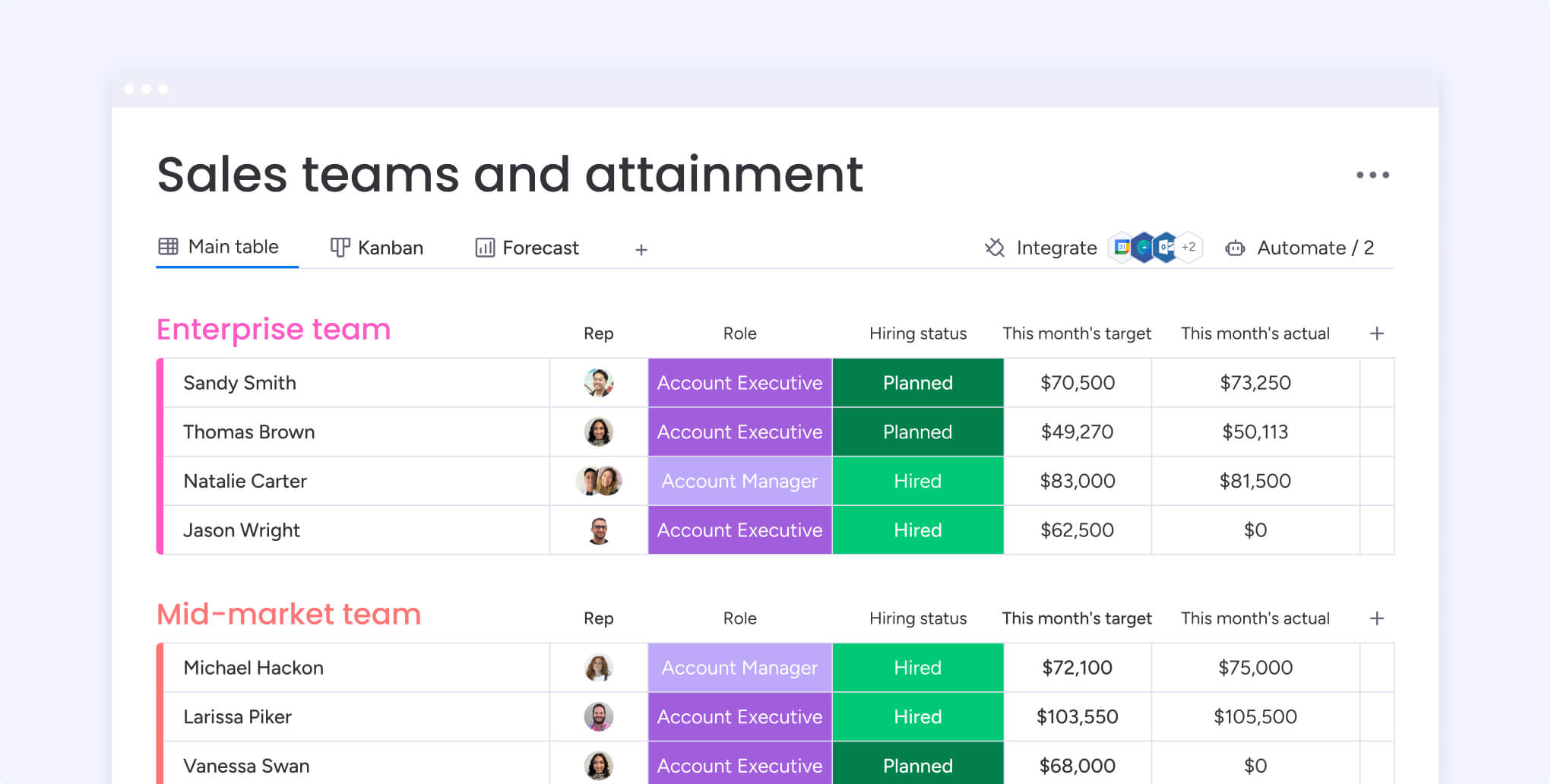
How to measure ROI from AI business solutions?
Demonstrating the return on investment for AI tools is crucial for justifying the expenditure and securing future budget. Measuring AI’s impact transforms sales from a perceived art into a data-backed science, providing the evidence needed to double down on successful strategies.
When the technology connects to tangible results, confidence is gained to reinvest in what works. This section will break down exactly how to measure the metrics that matter.
- Track time saved on manual tasks: measures the hours recovered from automating administrative duties (like data entry and research) to quantify the time AI returns to the sales team for higher-value activities.
- Monitor pipeline velocity changes: measures how quickly deals move through the pipeline (deal cycle length and stage conversion rates) to prove that AI-powered automation is creating faster, more efficient, and predictable revenue generation.
- Measure lead quality improvements: measures the increase in conversion rates (lead-to-opportunity and opportunity-to-close) to demonstrate that AI is successfully focusing the sales team’s efforts on high-potential prospects.
Choosing the right AI solution for your business development team
The vast menu of AI tools can feel overwhelming, but as we’ve alluded to above the secret isn’t finding one ‘perfect’ solution: it’s about targeting your team’s biggest bottleneck and solving it, fast.
Forget trying to overhaul everything at once. Focus on a single, high-impact win that makes everyone’s life easier and builds real momentum for what comes next.
A powerful solution is useless if the team avoids it or if it fails to connect to your existing tech, leading to data silos and frustrating manual work. AI should function as a helpful teammate, not as another login to forget. For this reason, solutions like monday CRM embed powerful automation and intelligence into a platform designed for seamless integration with the tools users already rely on.
Look past the sticker price and consider the true cost of any new tool, from hidden fees to the time your team will spend learning it. The best investment delivers value from day one, helping your team close more deals, not just navigate another complex system.
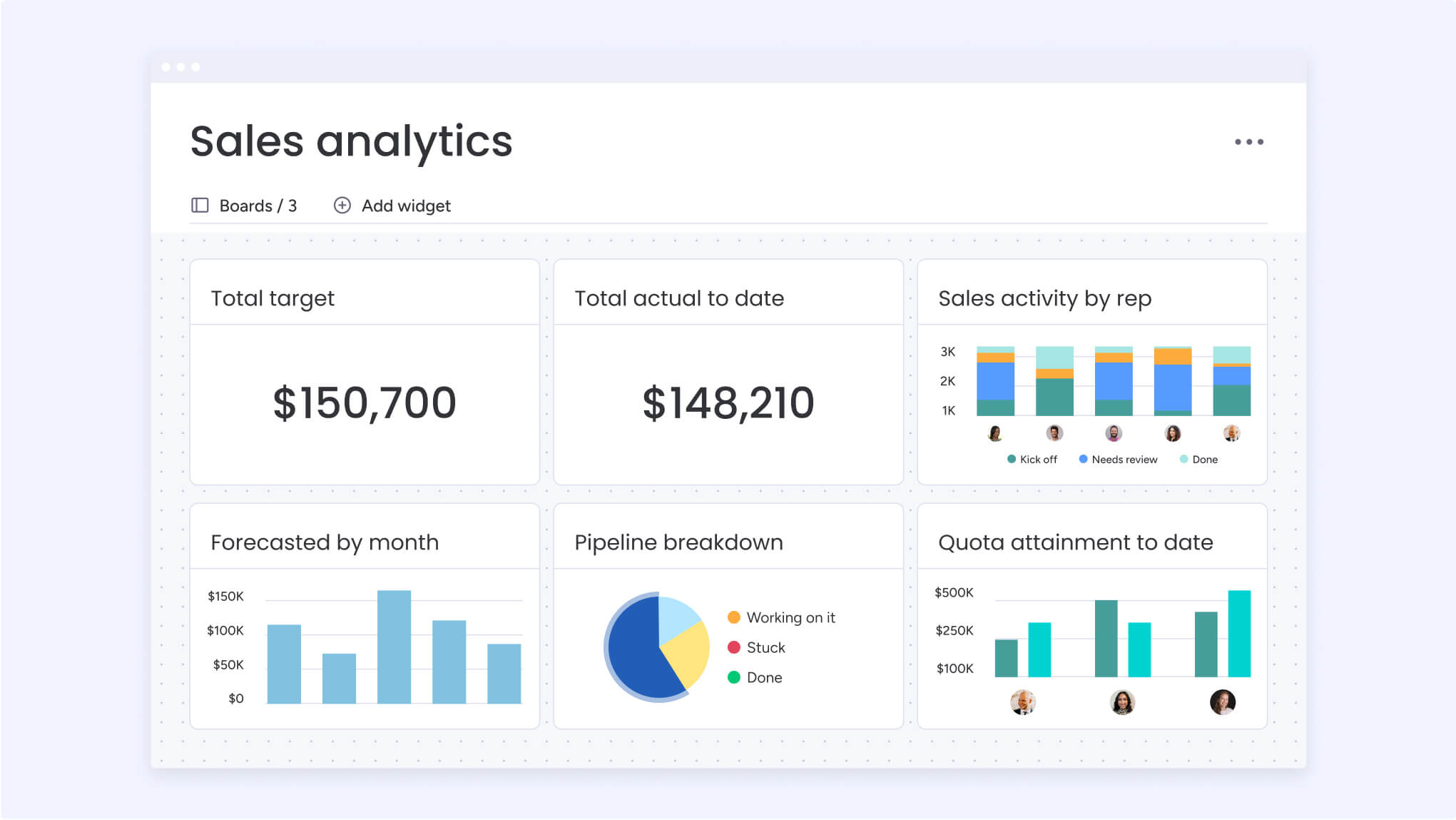
How to balance AI efficiency with human connection
AI in sales is not about replacing the human touch; it’s about supercharging it. The most effective teams understand that AI is their secret weapon for automating the grunt work, which allows them to focus on the conversations that actually close deals. You get to skip the busywork and get straight to building relationships.
- Think of AI as the ultimate teammate: one that drafts follow-ups, summarizes calls, and preps your research before you even ask.
- It handles the administrative grind with precision: freeing up your team’s energy for what they do best: connecting with people and solving problems.
- This is about striking the perfect balance: between automation and authentic connection.
- Your prospect won’t know AI helped you prep: but they’ll absolutely feel it when you show up sharp, insightful, and completely focused on them.
Transform your business development with monday CRM's AI capabilities
Your sales team is swamped with busywork, and you’re tired of watching good deals go cold. Juggling platforms and chasing down data is a massive time-suck that kills momentum and leaves you guessing. This challenge is understood.
The AI capabilities within monday CRM are built for the people actually doing the selling, not just data scientists. The platform gives your team the power to automate the grind, focus on high-value conversations, and close more deals with total confidence.
Visual AI-powered pipeline management
Stop hunting through spreadsheets and get your entire pipeline in one clear, visual dashboard. The platform’s AI gives you a sixth sense for sales, flagging at-risk deals and serving up smart next steps so you’re always ahead of the game. This isn’t just about looking at data; it’s about making confident moves.
Insights are placed right where your team works, turning complex pipeline info into simple, actionable plays. This keeps deals moving and ensures everyone is aligned on what matters most, right now.
No-code AI implementation for sales teams
The belief is that the best person to build a sales workflow is a salesperson, not a developer. A no-code approach lets your team automate their own processes and customize intelligence features in minutes, no IT ticket required. This is about putting serious power directly into your team’s hands.
When your reps can build the exact tools they need to be faster and smarter, you unlock a whole new level of performance. It’s about giving them the autonomy to win.
Unified platform from lead to revenue
Tired of duct-taping your lead gen, sales, and account management tools together? A single unified platform was built to manage the entire customer journey, with powerful AI at every single step. This means your data flows seamlessly from first touch to final sale and beyond.
Your team gets a single source of truth, making handoffs cleaner and collaboration finally feel effortless. Everyone works from the same playbook, driving toward the same goal.
The content in this article is provided for informational purposes only and, to the best of monday.com’s knowledge, the information provided in this article is accurate and up-to-date at the time of publication. That said, monday.com encourages readers to verify all information directly.
Frequently asked questions
What is the average cost of AI business development tools?
The average cost of AI business development tools typically ranges from $20–$150+ per user, per month. The true cost, however, should include implementation time and training resources to accurately measure its value.
How long does it take to see ROI from an AI business development tool implementation?
Most teams see initial ROI within 30–90 days. Faster returns come from intuitive platforms that minimize setup and training, allowing your team to adopt them quickly.
Can AI business development tools integrate with my existing CRM system?
Yes, most modern AI tools integrate with popular CRMs, but the quality of these connections varies. Look for platforms with both flexible integrations and strong native capabilities to avoid over-reliance on third-party apps.
Do I need technical skills to use AI business development tools?
No, leading platforms like monday CRM are designed with intuitive, no-code interfaces. Your team should be able to automate workflows and customize pipelines without needing technical expertise.
How do I ensure data privacy when using AI business development tools?
Verify the vendor's security certifications (like GDPR and SOC 2), data encryption practices, and data handling policies. A trustworthy partner will be transparent about their security and compliance framework.
What's the difference between AI agents and traditional sales automation?
Traditional automation follows pre-set rules, while AI agents can learn from data, adapt their actions, and make intelligent decisions independently. AI helps your sales process evolve and get smarter over time.

